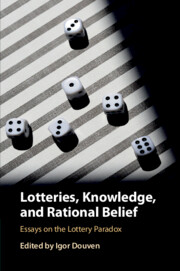Book contents
- Lotteries, Knowledge, and Rational Belief
- Lotteries, Knowledge, and Rational Belief
- Copyright page
- Contents
- Contributors
- Introduction
- Chapter 1 Rational Belief and Statistical Evidence
- Chapter 2 Knowledge Attributions and Lottery Cases
- Chapter 3 The Psychological Dimension of the Lottery Paradox
- Chapter 4 Three Puzzles about Lotteries
- Chapter 5 Four Arguments for Denying that Lottery Beliefs Are Justified
- Chapter 6 Rethinking the Lottery Paradox
- Chapter 7 Rational Belief in Lottery- and Preface-Situations
- Chapter 8 Stability and the Lottery Paradox
- Chapter 9 The Lottery, the Preface, and Epistemic Rule Consequentialism
- Chapter 10 Beliefs, Probabilities, and Their Coherent Correspondence
- Chapter 11 The Relation between Degrees of Belief and Binary Beliefs
- Bibliography
- Index
Chapter 11 - The Relation between Degrees of Belief and Binary Beliefs
A General Impossibility Theorem
Published online by Cambridge University Press: 29 January 2021
- Lotteries, Knowledge, and Rational Belief
- Lotteries, Knowledge, and Rational Belief
- Copyright page
- Contents
- Contributors
- Introduction
- Chapter 1 Rational Belief and Statistical Evidence
- Chapter 2 Knowledge Attributions and Lottery Cases
- Chapter 3 The Psychological Dimension of the Lottery Paradox
- Chapter 4 Three Puzzles about Lotteries
- Chapter 5 Four Arguments for Denying that Lottery Beliefs Are Justified
- Chapter 6 Rethinking the Lottery Paradox
- Chapter 7 Rational Belief in Lottery- and Preface-Situations
- Chapter 8 Stability and the Lottery Paradox
- Chapter 9 The Lottery, the Preface, and Epistemic Rule Consequentialism
- Chapter 10 Beliefs, Probabilities, and Their Coherent Correspondence
- Chapter 11 The Relation between Degrees of Belief and Binary Beliefs
- Bibliography
- Index
Summary
Agents are often assumed to have degrees of belief (“credences”) and also binary beliefs (“beliefs simpliciter”). How are these related to each other? A much-discussed answer asserts that it is rational to believe a proposition if and only if one has a high enough degree of belief in it. But this answer runs into the “lottery paradox”: The set of believed propositions may violate the key rationality conditions of consistency and deductive closure. In earlier work, we showed that this problem generalizes: There exists no local function from degrees of belief to binary beliefs that satisfies some minimal conditions of rationality and nontriviality. “Locality” means that the binary belief in each proposition depends only on the degree of belief in that proposition, not on the degrees of belief in others. One might think that the impossibility can be avoided by dropping the assumption that binary beliefs are a function of degrees of belief. We prove that, even if we drop the “functionality” restriction, there still exists no local relation between degrees of belief and binary beliefs that satisfies some minimal conditions. Thus functionality is not the source of the impossibility; its source is the condition of locality. If there is any nontrivial relation between degrees of belief and binary beliefs at all, it must be a “holistic” one. We explore several concrete forms that this “holistic” relation could take.
- Type
- Chapter
- Information
- Lotteries, Knowledge, and Rational BeliefEssays on the Lottery Paradox, pp. 223 - 254Publisher: Cambridge University PressPrint publication year: 2021
- 6
- Cited by



